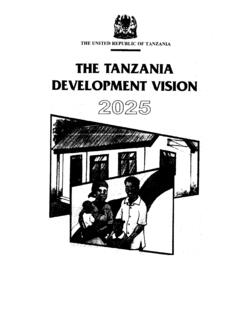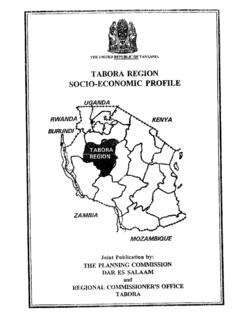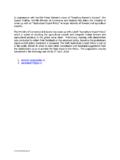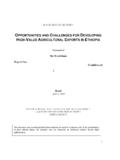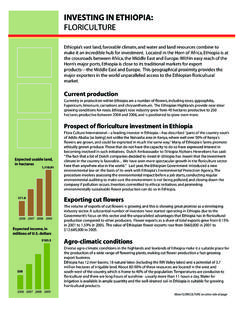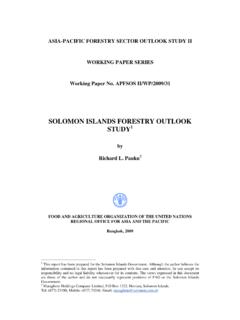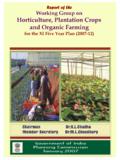Transcription of The Global Financial Crisis and Tanzania: Effects and ...
1 The Global Financial Crisis and tanzania : Effects and Policy Responses Final Report Dr. H. B. Lunogelo Mr. A. Mbilinyi Ms . M. H a n g i The Economic and Social Research Foundation (ESRF), 51 Uporoto Street, (off Ali Hassan Mwinyi Road), Ursino Estate, Box 31226, Dar es Salaam, tanzania , Phone: (255-22) 2760 260, 2760 758, Mobile: (255-754) 780 133. Fax: (255-22) 2760 062. Email: Web: 31th December, 2009. Global Financial Crisis and tanzania : Effects and Policy Responses Page 1 TABLE OF CONTENTS. LIST OF TABLES .. iv LIST OF ABBREVIATIONS .. v ABSTRACT .. vi INTRODUCTION .. 1 Global Financial Crisis ON tanzania .. 2 Introduction .. 2 3 Import .. 5 World Commodity Prices .. 5 Agriculture .. 6 Financial Sector .. 7 Industrial Sector .. 7 Tourism Sector .. 8 Tourism Promotion .. 8 Mining Sector.
2 9 Remittances and Migration .. 11 3. 0 BROAD MACROECONOMIC INDICATORS .. 12 Introduction .. 12 Exchange Rate Movements .. 12 Inflation 13 Fiscal Operation .. 15 Money Market .. 16 Equities .. 17 Investment and Capital Flows .. 17 Employment .. 19 Poverty Status .. 19 Public and Private Debt .. 19 External Debt .. 19 Domestic Debt .. 21 POLICY RESPONSES AND 22 Strategic Interventions at International and Country Level .. 22 Economic and Social Policies .. 22 Global Financial Crisis and tanzania : Effects and Policy Responses Page ii Growth and Development Policies .. 24 OPPORTUNITIES AND WAY FORWARD .. 25 Challenges .. 25 Opportunities .. 25 The Way 25 REFERENCES .. 27 28 Annex 1: Exports by Type of Commodities (July 2008 - July 2009) .. 28 Global Financial Crisis and tanzania : Effects and Policy Responses Page iii LIST OF TABLES.
3 Figure 1 Agricultural, Mining and Industrial Sector Exports .. 3 Table 2: World Commodity Prices (2007-2009) .. 5 Table 3: Mining Licenses granted for Mining activities in tanzania .. 10 Table 4: Inflation Development 2008 -2009(Annual headline,food and Non food) .. 14 Table 5: Quarterly Average prices for Equities in the 17 Table 6: Approved Projects 1996 -2008 .. 18 Table 7: tanzania 's External Debt Stock by Borrower Category (US$ mill.) .. 20 Global Financial Crisis and tanzania : Effects and Policy Responses Page iv LIST OF ABBREVIATIONS. ADB - Agricultural Development Bank BOT - Bank of tanzania CRDB - Cooperative and Rural Development Bank CBA - Commercial Bank of Africa COMESA - Common Market for Eastern and Southern African DOD - Disbursed Outstanding Debt DSE - Dar es Salaam Stock Exchange Market ESF - Exogenous Shock Facility EAC - East African Community FDI - Foreign Direct Investment GDP - Gross Domestic Product GFC - Global Financial Crisis GTV - Government Television IMF - International Monetary Fund IPO - Initial Public Offer KCB - Kenya Commercial Bank MDG - Millennium Development Goals MFEA - Ministry of Finance and Economic Affairs NMB - National Microfinance Bank PPP - Public Private Partnership SADC - Southern Africa Development Countries SDR - Special Drawing Right SMEs - Small Micro Enterprises
4 TANAPA - tanzania national Parks Authority TATEPA - tanzania Tea Parkers TASAF - tanzania Social Action Fund TCC - tanzania Cigarette Company TIB - tanzania Investment Bank TIC - tanzania Investment Centre TTB - tanzania Tourist Board USA - United States of America VAT - Value Added Tax ZATI - Zanzibar Tourism Investors Global Financial Crisis and tanzania : Effects and Policy Responses Page v ABSTRACT. This paper examines the impact of the recent Global Financial Crisis (GFC) in tanzania . It gives a snap shot of the economic, Financial and social Effects of the current worse Global economic down turn and summarises the policy responses at national level to rescue the economy from eroding the past achievements reached. At macro level, the Crisis has reversed the tanzania 's GDP growth projection from 8 per cent to 5 percent for year 2009/10; this projection has negative implication in terms of investments, employment and income to various actors in the economy.
5 Initially the Global Effects to tanzania were limited such that the country survived the first round Effects of the GFC. This was attributed to the country's low levels of integration with the international Financial markets. As the GFC was becoming severe worldwide, the Effects started to be felt in the Tanzanian economy and the banking sector in tanzania started worrying that trade in finance was increasingly becoming more risky as the country's export commodity prices continued to lose value in the world market, export orders reduced and the revenues from the tourist sector dwindled as tourists postponed their holiday visits. Early in 2009 there were already indications that the Crisis had adversely affected a number of sectors such as: agricultural, mining and the tourism sectors.
6 By May 2009 the Tanzanian government estimated a loss of about US$255 million from domestic income occasioned by the Global Financial Crisis . However the analysis by sector indicates that by the third quarter of 2009, using various indicators such as profitability, liquidity and other Financial assets; the Financial sector in tanzania was still sound although some banks experienced an increase in their non performing loans and decline in price of equities in the Dar es Salaam Stock Exchange (DSE) and foreign exchange inflows (remittances). The trade sector suffered some setbacks as agricultural exports, minerals and gemstones, traditional crops and non- traditional crops recorded negative growth. However, trade in industrial goods recorded a positive trend, which was accounted by the increase in regional trade between tanzania and its EAC neighbors.
7 An improved performance was also recorded in manufactured goods; horticultural products; fish and fish products. In terms of investments, the available information has confirmed that some multinational companies have decided to close their operations and hundreds of workers have been declared redundant as a result of the Crisis . The TIC recorded a decrease in FDI projects (for year 2009). and low employment creation from the registered projects despite an increased in FDI value. To counteract GFC affects; the tanzania government came up with the following policy responses: Formed a Crisis committee led by the BOT governor who updates and advises the government on regular bases. A Two-Year Economic Rescue Plan was instituted (for FY 2009/10 to 2010/11) that was also approved by the parliament.
8 Applied for a loan amounting to USD 336 million from the IMF under the Exogenous Shock Facility (ESF) to fill the gap in the balance of payment. Global Financial Crisis and tanzania : Effects and Policy Responses Page vi The Government has already channeled billion of that package directly to the banking sub-sector to cover losses suffered by bank clients like co-operatives and firms which bought agricultural products from farmers. Improved foods distribution to curb food shortages in the country; to cushion against the decline in incomes in some families; allocated Tsh 20 billion in FY 2009/09 budget to ensure food availability at a reasonable cost. Provision of affordable capital for businesses. Under this scheme, the Government has released a stimulus package of billion through the commercial banks.
9 Under the Central Bank of tanzania , the government has intensified surveillance of both domestic and international capital Financial markets to oversee the performance of all Financial institutions. The government has also formed a Financial Sector Regulatory Authority. It has also established an early warning system using selected Financial soundness indicators;. through this measure an oversight of the banking system has been intensified. The BOT. has also established a Financial stability department that produces regular Financial stability reports. The BOT holds on daily basis surveillance meetings to ensure stability in the Financial sector and availability of appropriate level of liquidity in the system. Although the GFC had negative Effects in the country's growth path, it provides some challenges and opportunities for the country.
10 The challenges are in its low domestic revenue generation capacity and productivity and weak infrastructures systems, where as the opportunities exist such as; wide diversification ability due to large natural resources base and increase in income from exports due to expanding regional trade in the EAC. Global Financial Crisis and tanzania : Effects and Policy Responses Page vii INTRODUCTION. The Global Financial Crisis (GFC) has been referred as the worst since the Great Depression of the 1930s. It has contributed to the failure of key businesses; decline in consumer wealth estimated in trillions of dollars; triggered a significant decline in economic activities; and prompted substantial Financial commitments by governments. The main reasons for this failure were mortgage loans extended to borrowers at highly concessional terms; weak oversight and poor supervision of banks and Financial institutions; and excessive relaxation of fundamental rules and regulatory requirements for Financial institutions.
